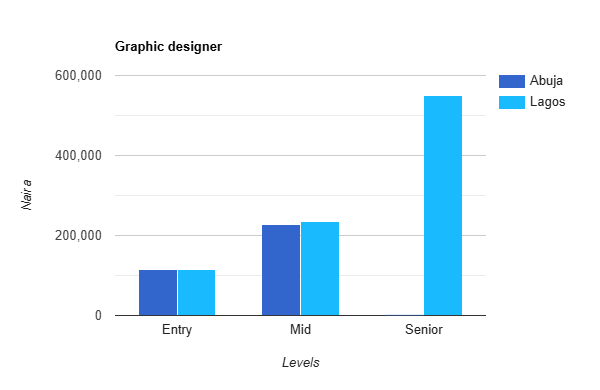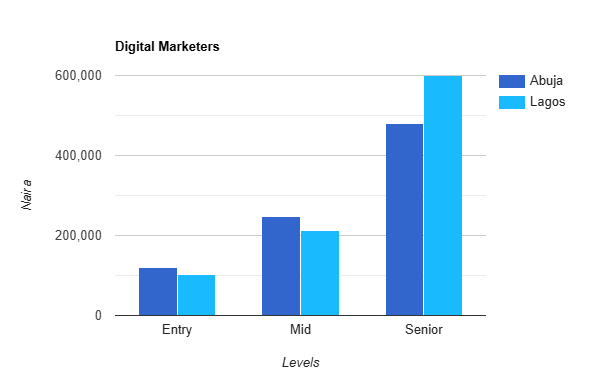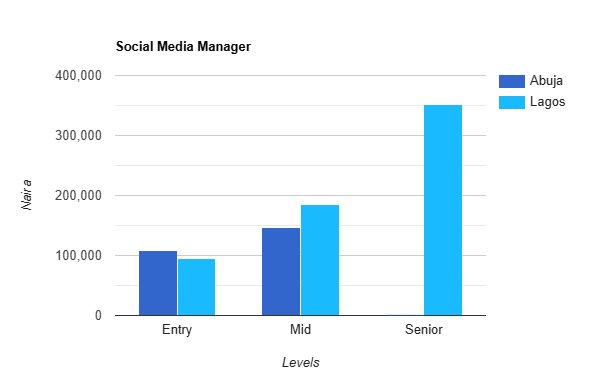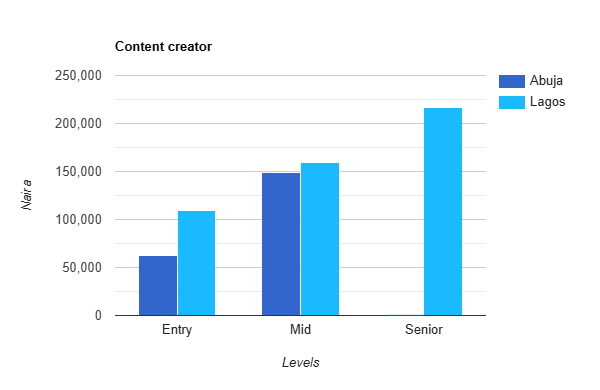Effective communication is crucial across all sectors, from corporate entities to nonprofits and government agencies. It not only fosters internal cohesion but also moulds external perceptions, impacting stakeholders and the wider public. Have you ever wondered how much these folks crafting your favourite brand’s story make? Let’s talk about the people behind the scenes today: the communications team. We’ll explore the average salary ranges for communications professionals in Nigeria.

Communication teams play pivotal roles in businesses, non-profits, and government as they are the storytellers, media managers, and information conduits, shaping organizational narratives, enhancing brand reputation, and nurturing public trust. However, the salaries for communication professionals in Nigeria may vary significantly as factors like role specificity, industry type, geographical location within Nigeria and even economic dynamics can heavily influence compensation levels.
In this post, we will be providing you with a better understanding of these factors with researched insights into the earning differences among the various communication roles and grades across Nigeria and so, whether you’re a seasoned PR pro or just starting in communications, this post is for you. Let’s get real about those numbers!

What are the Key Roles in a Communications Team?
A communications team is made up of a wide range of roles that work together most times to achieve common goals as each role within the team contributes uniquely to shaping the organization’s public image, enhancing stakeholder relations, and driving strategic initiatives forward.
Understanding the importance of each role within a communications team is very necessary for setting the right compensation packages and ensuring they attract and retain top talent who can effectively navigate the complexities of communication in today’s competitive environment. Within a communications team, you’ll typically find the following key roles:

- Communications Officer: He/she oversees the entire communication strategy as they are responsible for developing plans, setting goals, managing budgets, and ensuring all communication efforts align with organizational objectives.
- Public Relations (PR) Specialist: This role is responsible for managing the organization’s public image and reputation as they write press releases, organize media events, handle media inquiries, and manage crisis communications.
- Social Media Manager: A social media manager manages an organization or brand’s social media presence. They create content calendars that keep social media pages running smoothly, engage with followers, monitor social media trends, and analyze performance metrics to optimize engagement.
- Digital Marketer: This role focuses on digital channels like websites, email marketing, and online advertising as they are in charge of developing digital campaigns, analyzing data, and optimizing strategies to increase online visibility and engagement.
- Copywriter: These are the brains behind a lot of advertising services you see daily. They write persuasive and engaging copies for marketing materials, advertisements, websites, and more by crafting compelling messages that resonate with your audience and drive action.

- Content Creator/Manager: He/she creates compelling content across various platforms such as engaging reels, videos, and social media posts and they ensure content is aligned with the brand voice, engages the target audience, and supports marketing objectives.
- Graphic Designer: He/she designs visual content such as infographics, logos, website layouts, and marketing materials and ensures visual consistency across all communication channels thereby enhancing brand identity.
- Video Producer/Editor: This role is responsible for Producing and editing video content for various platforms as they shoot footage, edit videos, add graphics and effects, and optimize videos for different channels.
- Event Coordinator: They Plan and execute events to promote the organization or a brand and engage stakeholders and they are also responsible for managing logistics, coordinating with vendors, creating promotional materials, and overseeing event marketing and communications.
- Community Manager: They are the ones who manage online communities and engage with followers on social media and forums. They respond to comments and messages, foster relationships with followers, and specific audiences, and also act as the brand’s ambassador online.
- Market Research Analyst: They are responsible for researching to understand market trends, consumer behavior, and competitive landscapes and analyzing data to inform communication strategies, identify opportunities, and measure campaign effectiveness.
Factors influencing salary ranges for communications professionals in Nigeria
- Experience Level
Experience will always play a critical role in determining salary levels in communications roles and all roles, especially in Nigeria where almost every role is dependent on your qualifications and demonstrated capability. Entry-level professionals typically earn less than their more experienced counterparts who have accumulated years of relevant experience, this is because as professionals gain expertise and demonstrate their ability to deliver results, their earning potential generally increases. Senior positions such as Communications Directors or Managers will typically command higher salaries due to their strategic responsibilities and extensive experience in managing communication campaigns, crises, and stakeholder relations. - Geographic Location
Your geographic location plays a crucial role in determining salaries within the communications field as salaries will typically vary widely depending on whether you’re in a bustling metropolis like Lagos or Abuja, where living costs are higher, demand for skills is strong, and economic activity is vibrant or in smaller cities which often offer lower salaries due to their lower cost of living and potentially less competition for skilled professionals. - Industry Sector
The industry or sector in which a communications professional works also influences salary levels. For instance, roles in corporate communications within sectors such as finance, technology, or healthcare often offer higher salaries than communications roles in non-profit organizations or government agencies. Corporate sectors typically have larger budgets allocated to marketing and communications, which allows them to offer competitive compensation packages to attract top talent. - Educational Background and Skills
Educational qualifications and specialized skills can impact salary negotiations in communications roles to a great extent as professionals with relevant degrees such as communications, public relations, journalism, or marketing may command higher salaries when compared to their colleagues who could be transitioning from unrelated backgrounds. This difference is particularly pronounced when accompanied by certifications or advanced training in areas such as digital marketing, crisis communications, or social media management. Additionally, skills in strategic planning, media relations, content creation, and data analysis are highly valued and can justify higher compensation. - Demand and Market Trends
Market demand for specific skills and emerging trends in communications also influence salary levels. For example, professionals with expertise in digital marketing, social media management, or crisis communications may see higher demand and subsequently higher salaries because as organizations increasingly prioritize digital communication strategies and engagement with online audiences, professionals with skills in digital platforms and analytics are becoming increasingly valuable. - Professional Network and Reputation
Having a strong professional network and a positive industry reputation can also influence salary negotiations significantly. This is because professionals who are well-connected, actively involved in industry associations, and recognized for their achievements will oftentimes have more leverage in negotiating higher salaries and securing lucrative career opportunities because these connections and recognition not only enhance their credibility but also open doors to new possibilities and better compensation packages. - Company Size and Budget
The size of an organization and its budget for communications are critical factors in determining salary offerings. Larger companies such as the likes of Coca-Cola, Indomie, Airtel, etc with expansive marketing and communications budgets are generally able to offer more competitive compensation packages compared to smaller organizations with limited resources. Take Airtel, for example, a prominent network service provider in Nigeria, we can see that Airtel spends a lot on its communication strategies to stay visible in the market and connect well with millions of customers and likewise, Coca-Cola has a big budget for marketing, running large campaigns across different platforms and regions to strengthen its position as a top global beverage brand. So, expecting smaller companies to offer the same compensation packages as these giant companies would be simply unrealistic as their financial resources are lesser and they tend to focus more on agility and innovation than high salaries & rather attract talent with perks like equity options, opportunities for career growth, and a vibrant work environment.

Average Salary Range of Various Communication Roles In Nigeria (Lagos & Abuja)
If you’ve ever wondered about the average salaries for various communication roles in Nigeria, specifically in Lagos and Abuja, we’ve conducted this research to provide you with valuable knowledge. Whether you’re a professional looking for the best opportunities or an employer aiming to attract top talent with competitive compensation packages, this information will guide you.
1) Communication Officers
Lagos vs Abuja
From the above chart, Communications Officers in Lagos earn between 150,000 and 620,000, reflecting high demand and the city’s cost of living. In Abuja, salaries range from 120,000 to 700,000, due to the significant responsibilities involved. Despite similar living costs, both cities offer competitive salaries.
2) Graphic Designers

Lagos vs Abuja
Graphic Designers in Lagos can expect to earn between 100,000 and 550,000, with salaries reflecting the vibrant advertising and marketing industry and high demand for creative skills. In contrast, Graphic Designers in Abuja typically earn slightly less due to the lower competition and less intense market for design roles in the city.
3) Digital Marketers

Lagos vs Abuja
In Lagos, digital marketers earn between 100,000 and 600,000, reflecting its status as a digital marketing hub. In Abuja, salaries range from 100,000 to 450,000. While demand is growing, the market is less saturated than in Lagos, resulting in slightly lower salaries.
4) Social Managers

Lagos vs Abuja
Social Media Managers in Lagos earn between 90,000 and 350,000, benefiting from the city’s strong digital marketing focus and high social media engagement. The demand for strategic content planning and audience interaction influences this salary range. In Abuja, Social Media Managers earn between 100,000 and 150,000 & although the role is important for brand engagement, salaries are lower due to reduced competition.
5) Content Creators

Lagos vs Abuja
Content Creators in Lagos earn between 100,000 and 200,000, driven by the high demand for engaging content and a competitive media environment while in Abuja, salaries range from 50,000 to 150,000, reflecting a less competitive market.
6) Copy Writers

Lagos vs Abuja
Copywriters in Lagos command a higher salary range, starting from 90,000 Naira and above & is largely due to the city’s media landscape, where creative writing plays a pivotal role in shaping brand identities and managing public relations.
In Abuja, copywriters typically earn between 70,000 and 250,000 Naira. While the salary range is generally lower than in Lagos, it’s influenced by factors like the city’s focus on government and institutional PR, which often involves more structured communication and less emphasis on creative flair.
7) PR Specialists

Lagos vs Abuja
PR specialists in Lagos and Abuja earn salaries that typically fall between 130,000 Naira and 1,500,000 Naira. This wide range is influenced by various factors, including experience, professional network, reputation, and the specific demands of the role. Both cities benefit from a vibrant media landscape, and PR specialists play a crucial role in shaping brand perceptions and managing media relations, driving the demand for their services and, consequently, their earning potential.

Comparison with Industry Standards: Understanding Salary Trends for Communications Professionals in Nigeria
In recent years, the landscape for communications professionals in Nigeria has seen notable shifts which have been influenced by emerging trends such as the increasing demand for digital skills, remote work flexibility, and even comparisons with national averages. Let’s take a closer look at these factors:
1) Increasing Demand for Digital Skills
We have gone on to see that the digital transformation sweeping across industries globally has significantly impacted the communications sector in Nigeria as individuals with digital skills such as social media management, content marketing, SEO (Search Engine Optimization), content writing, public relations, and even digital analytics and the likes of it are increasingly in demand. Employers continue to value these skills as they recognize their ability to enhance brand visibility, engage audiences effectively, and drive effective digital marketing strategies and as a result, professionals possessing these capabilities often command higher salaries due to their ability to implement impactful digital strategies and drive meaningful growth.
2) Remote Work Flexibility
The COVID-19 pandemic accelerated the adoption of remote work practices, and this shift has had lasting effects on salary expectations in Nigeria’s communications industry, especially in bustling cities like Lagos and Abuja. Professionals who embrace remote or hybrid work arrangements often enjoy greater flexibility and may negotiate higher salaries. While some employers may argue that reduced commuting costs should lower salary expectations, the overall benefits of improved work-life balance and flexibility often lead to discussions around higher compensation.
However, as beautiful as remote work sounds, remote work also brings the challenge of facing more competition from global talent pools as a communications professional, and employers might tend to adjust salaries based on local cost-of-living standards compared to global standards, affecting how negotiations unfold for both employers and employees.

3) Comparison with National Averages
When comparing salaries of communications professionals in Nigeria to national averages, several factors must come into play as major cities like Lagos and Abuja typically offer higher salaries due to their higher cost of living, strong demand for skilled professionals, and competitive job markets and as such professionals in these cities often have access to more opportunities and better-paying roles within the communications industry while on the other hand, salaries in smaller cities tend to be lower due to lower cost of living and less competition for talent.
So if you’re a professional scanning through job opportunities or even an employer setting your compensation standards, you need to understand these differences to enable you to make informed decisions about salary negotiations and recruitment strategies tailored to your specific economic conditions and location across Nigeria.

The Importance of Understanding Salary Ranges of Communications Teams in Nigeria
Understanding salary ranges for communications professionals is crucial for both job seekers and employers alike as it not only helps candidates set realistic salary expectations but also enables organizations to attract and retain top talent through competitive compensation packages.
For Job Seekers
If you’re a professional seeking roles in the communications field, knowing the average salary ranges will help you in setting realistic expectations and negotiating fair compensation as this knowledge empowers you to make informed career choices aligned with your skills, location, experience, etc. By staying updated on industry standards, you can navigate job offers confidently and ensure you are adequately rewarded for your contributions to driving growth.
For Employers
As an employer, understanding salary ranges is of great importance to you because offering competitive compensation packages is necessary for attracting and retaining top talent in whatever industry you may fall in. When organizations align their salary offerings with market trends and candidate expectations, they not only attract skilled professionals but also foster a motivated and productive workforce which in turn, contributes to organizational success and stability.

At ThePush Consulting, we recognize the dual importance of salary transparency and competitive compensation and we strive to bridge the gap between candidates and employers by offering exceptional job opportunities that align with competitive salary expectations. We know that by facilitating these connections, we are contributing to the growth and success of both individuals and businesses in the communications sector ensuring mutual satisfaction and long-term partnerships.
You can follow us on Instagram to stay updated on various job openings and if you’re looking to hire for your business, click here to reach out to us.





